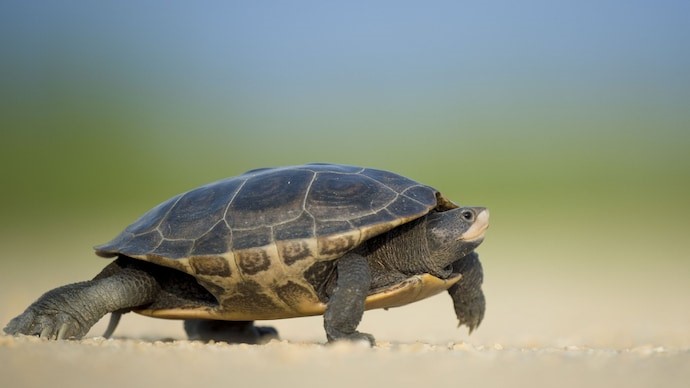Description

Disclaimer: Copyright infringement not intended.
Context
- World Turtle Day is an annual observance held every May 23rd.
About the day
- It began in 2000 and is sponsored by American Tortoise Rescue.
- The day was created as a yearly observance to help people celebrate and protect turtles and tortoises and their disappearing habitats, as well as to encourage human action to help them survive and thrive.
- The term "World Turtle Day" is trademarked by Susan Tellem of Malibu, California.
- This year's World Turtle Day theme is 'I Love Turtles,' emphasising the critical need to conserve these species and their future in the face of dwindling habitats.
- The theme highlights a special turtle named Mr. Mudd, capturing the essence of adoration and inviting people worldwide to celebrate the enduring existence of these remarkable creatures.
.jpeg)
The 10 Key Differences Between Turtles and Tortoises
Classification
- In terms of similarities, both creatures belong to the Animalia kingdom, the Chordata phylum, the Reptilia class, and the Testudines order.
- Tortoises belong exclusively to the family Testudinidae, but turtles belong to numerous different families.
Habitat
- Tortoises live exclusively on land.
- Turtles, on the other hand, are in the water some or all of the time. Therefore, you are unlikely to find turtles far from water, but it’s not unusual to find tortoises in more land-locked areas.
Distribution
- Turtles are primarily found in Africa and America.
- Tortoises, however, are mostly found in Asia and Africa. Many tortoise species are found in the Americas too.
- Most famously, tortoises are found in the Galapagos Islands, which are off the coast of South America.
Climate
- Tortoises are almost exclusively found in tropical and subtropical climates. However, some species can limit their metabolisms to cope with temperature drops.
- Turtles are also overwhelmingly found in tropical and subtropical climates. Because they hibernate, however, they tend to do well in a greater variety of climates than tortoises.
Limbs
- The limbs on a tortoise look remarkably similar to those of an elephant. They are sturdy and short, and they bend.
- Meanwhile, turtles, which spend lots of time swimming, have streamlined legs with webbed feet and long claws. These features allow them to attain higher speeds in the water.

Shell Shape
- Turtles’ shells help them move well in the water, so they are lightweight, flat, and streamlined.
- Tortoise shells, on the other hand, are designed more for protection on land. Therefore, they are heavy, oversized and concave, or dome-shaped.
Lifespan
- Tortoises are among the longest-living creatures on earth. Depending on the species, they can live anywhere from 80 to 150 years.
- The average lifespan for a turtle is significantly less at 20 to 40 years.
Diet
- Turtles consume vegetables, leafy greens, fruits, and meat, making them true omnivores.
- Most tortoises, however, almost exclusively subsist on plants. Therefore, they are considered herbivores.
Birth
- After hatching, baby turtles typically remain on their own in the nest for 90 to 120 days.
- Tortoise hatchlings, on the other hand, typically leave the nest quickly after birth.
Hibernation
- Some species of turtles hibernate through the winter in cold climates – typically along riverbanks.
- Meanwhile, because they live almost exclusively in tropical and sub-tropical climates, tortoises do not hibernate. However, they may limit their metabolisms in case of cold or otherwise harsh weather.
|
PRACTICE QUESTION
Q) Which of the following statements with reference to Turtles and Tortoises is/are incorrect?
1. Tortoises live exclusively on land.
2. Tortoises belong exclusively to the family Testudinidae, but turtles belong to numerous different families.
- 1 only
- 2 only
- Both 1 and 2
- Neither 1 nor 2
Correct Answer: 4
|

https://pib.gov.in/PressReleasePage.aspx?PRID=1926734






